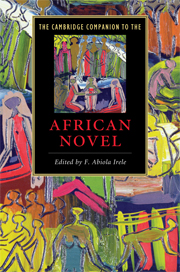Book contents
- Frontmatter
- 1 Introduction: perspectives on the African novel
- 2 The oral-literate interface
- 3 Chinua Achebe and the African novel
- 4 Protest and resistance
- 5 The Afrikaans novel
- 6 The African novel in Arabic
- 7 The francophone novel in North Africa
- 8 The francophone novel in sub-Saharan Africa
- 9 The African historical novel
- 10 Magical realism and the African novel
- 11 The African novel and the feminine condition
- 12 Autobiography and Bildungsroman in African literature
- 13 The postcolonial condition
- 14 New voices, emerging themes
- 15 The critical reception of the African novel
- Bibliography
- Index
6 - The African novel in Arabic
Published online by Cambridge University Press: 28 January 2010
- Frontmatter
- 1 Introduction: perspectives on the African novel
- 2 The oral-literate interface
- 3 Chinua Achebe and the African novel
- 4 Protest and resistance
- 5 The Afrikaans novel
- 6 The African novel in Arabic
- 7 The francophone novel in North Africa
- 8 The francophone novel in sub-Saharan Africa
- 9 The African historical novel
- 10 Magical realism and the African novel
- 11 The African novel and the feminine condition
- 12 Autobiography and Bildungsroman in African literature
- 13 The postcolonial condition
- 14 New voices, emerging themes
- 15 The critical reception of the African novel
- Bibliography
- Index
Summary
As Muṣṭafā Sa'īd, the Sudanese arch-seducer of al-Ṭạyyib Ṣāliḥ’s 1966 novel Mawsim al-Hijra ilā al-Shamāl (translated as Season of Migration to the North), plots to lure and destroy the Englishwoman Isabella Seymour, Isabella pops a question that could as easily be asked of the African novel in Arabic: “‘Mā jinsuka? Hal anta afrīqiyyun am asyawiyyun?’” [“‘What race are you?’ . . . ‘Are you African or Asian?’”]. Indeed, to speak of the African novel in Arabic is to raise eyebrows and questions, often interested, but just as often skeptical: What is “African” about Arabic? What is the African or the Arabic “novel”? And what is “Arabic” to Africa? It is, in short, to name a border genre, one that – like the persona of Muṣṭafā Sa'īd, who ends up describing himself as “mithla 'Uṭạyl, 'arabiyyun afrīqiyyun” (p. 42) [“like Othello, Arab-African” (p. 38)] – stands at formal, territorial, and ethnolinguistic angles to the African usually given the stamp of “authenticity.” The African novel in Arabic is eccentric to Africa, in part, because the genre is eccentric to Arabic: in its modern incarnation, it owes a few genes to the colonial influence of the Western European novel. Certainly Muṣṭafā Sa'īd’s reply to Isabella Seymour’s question reminds us that the histories, the geographies, and indeed the ideas of Europe and Africa impinge on one another – his reference to Othello alone bears witness to the profundity of the impact of European cultural imperialism on Arab-African subjectivity and self-writing.
- Type
- Chapter
- Information
- The Cambridge Companion to the African Novel , pp. 85 - 102Publisher: Cambridge University PressPrint publication year: 2009
- 3
- Cited by



